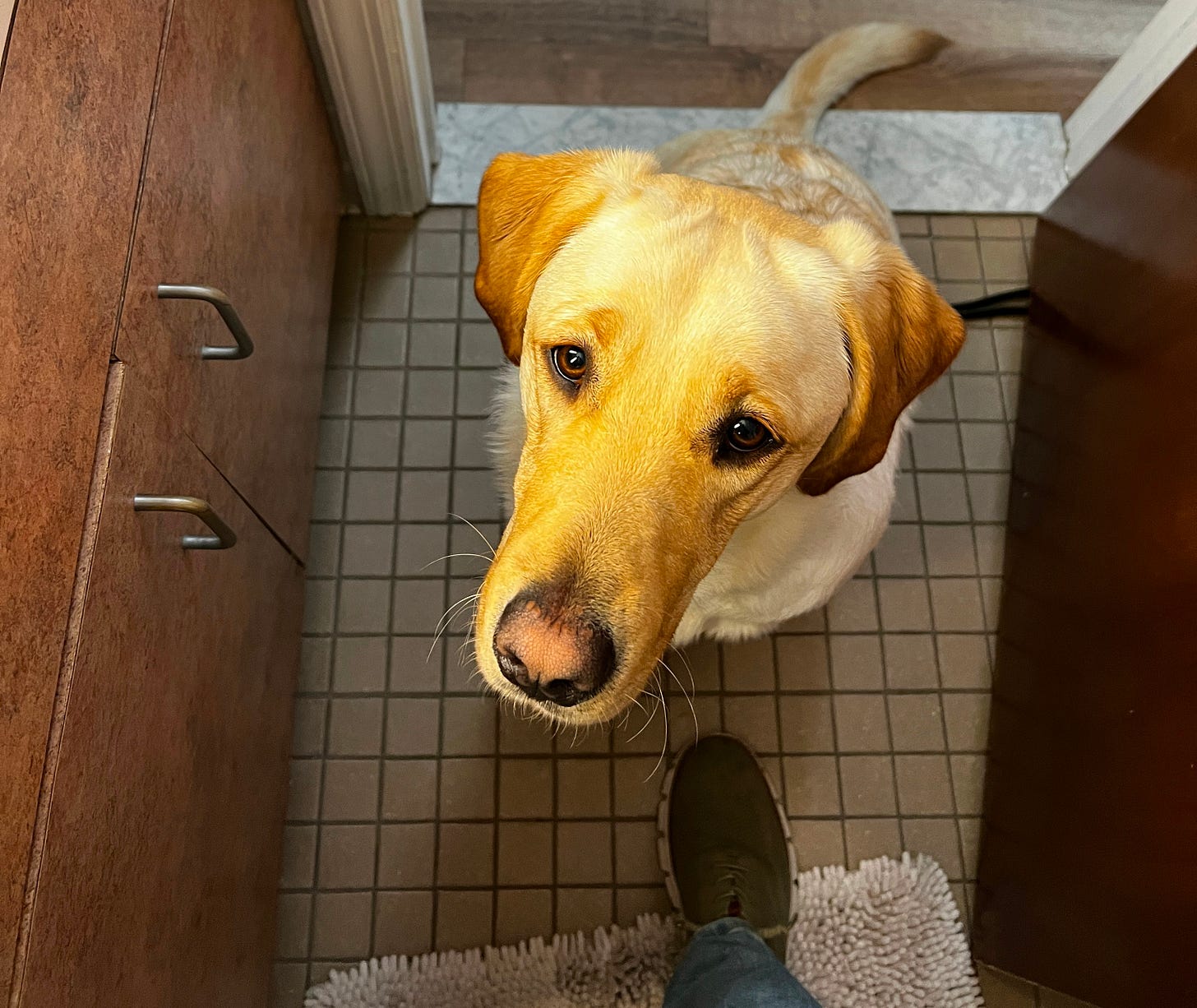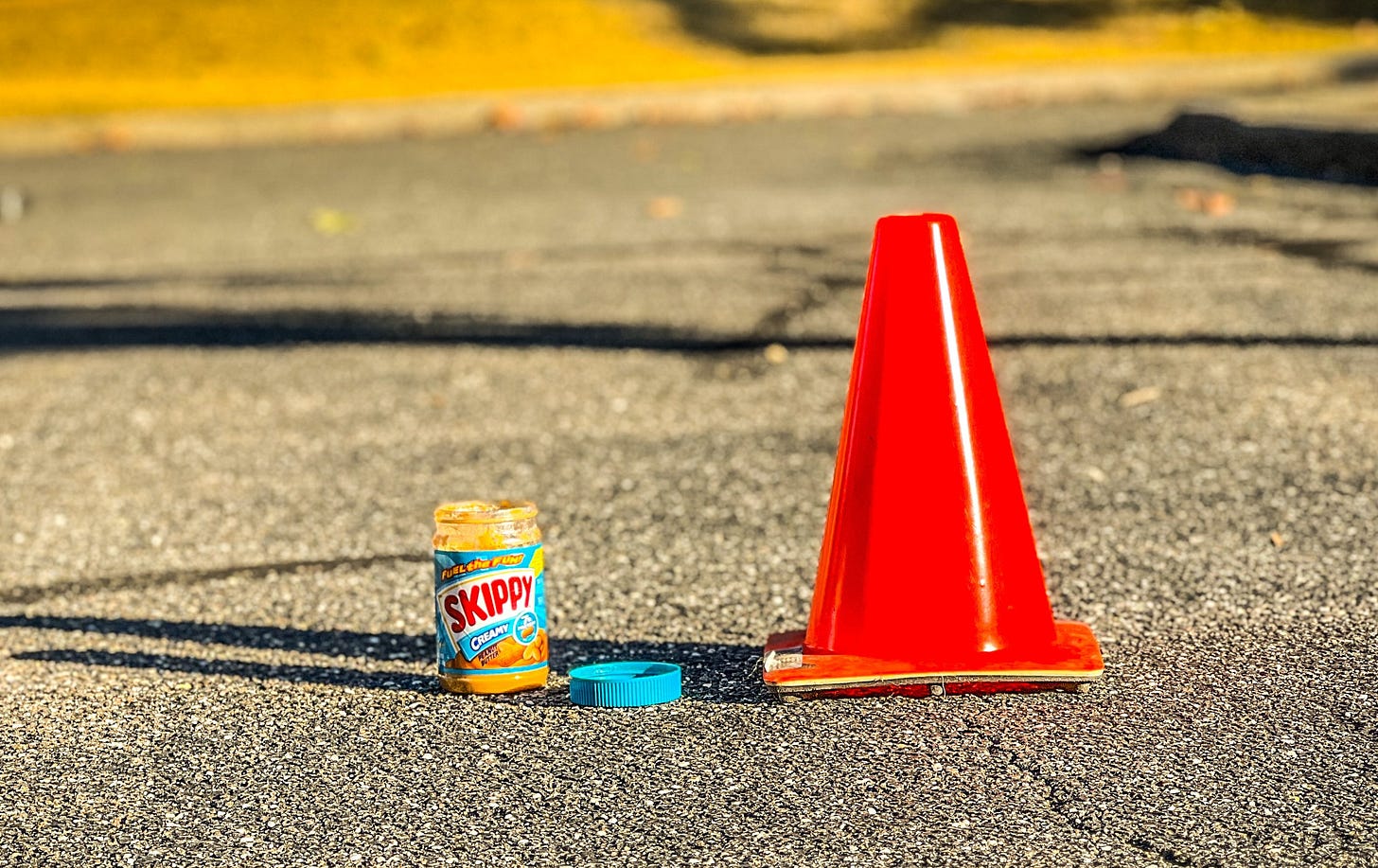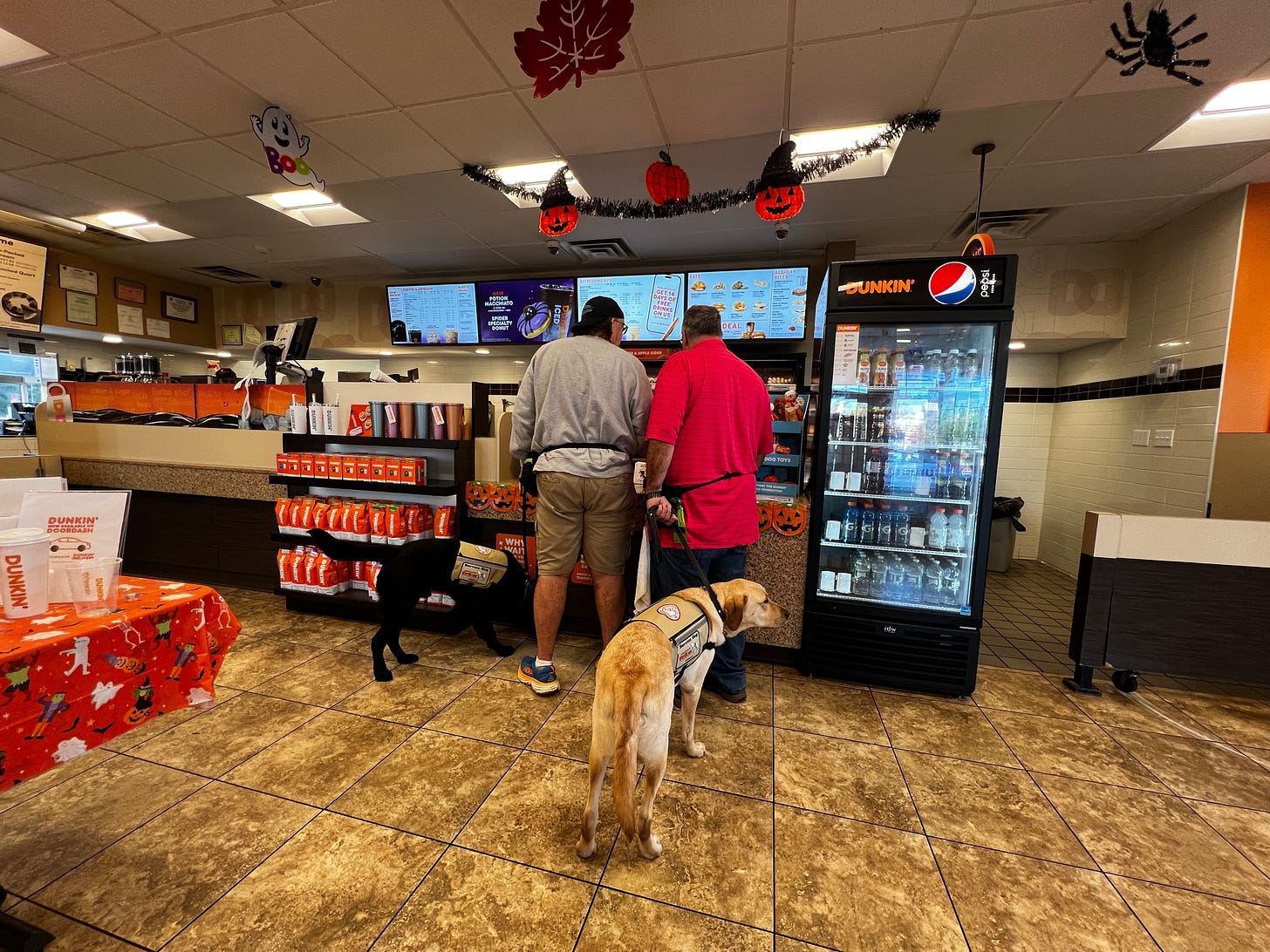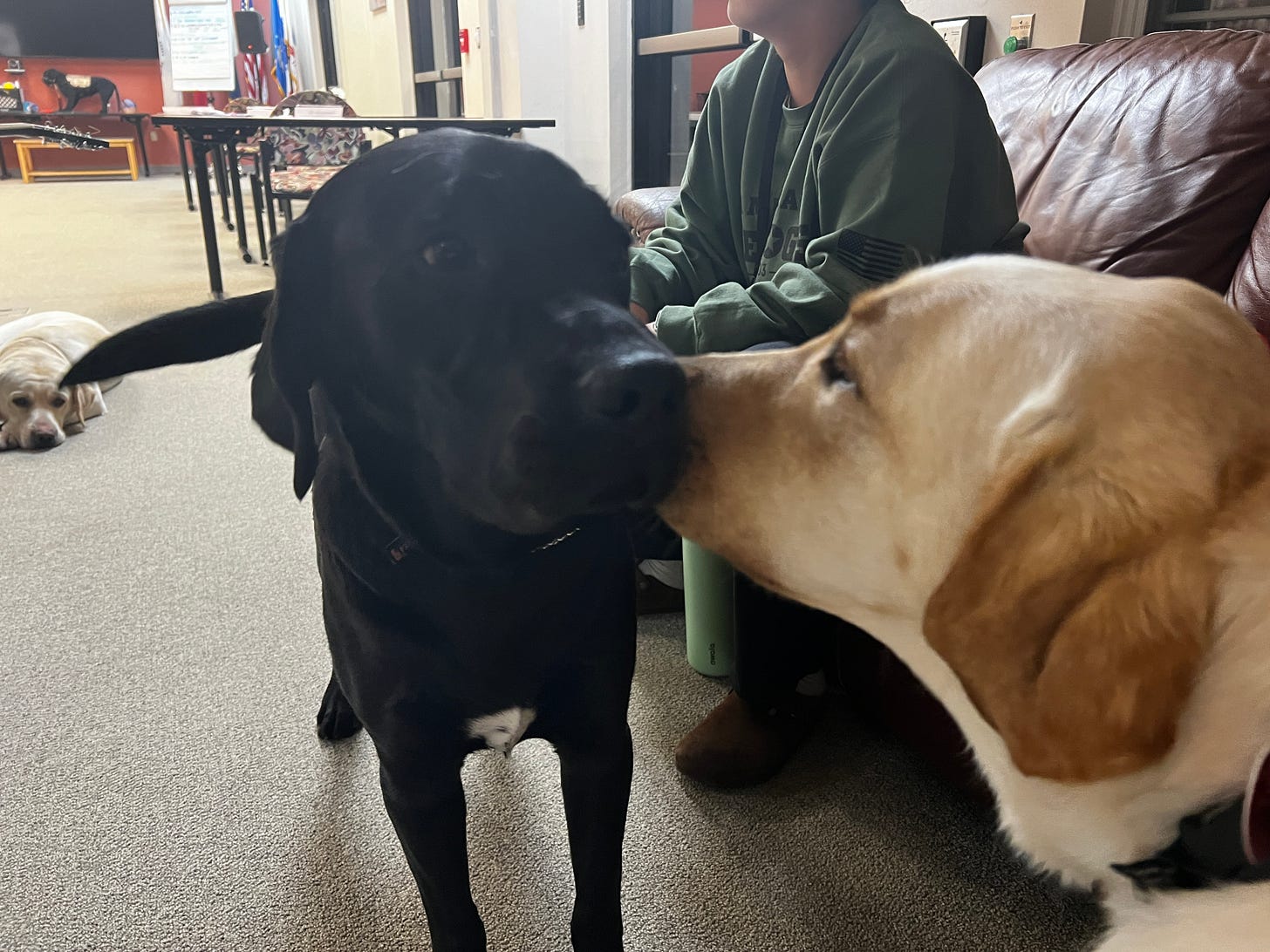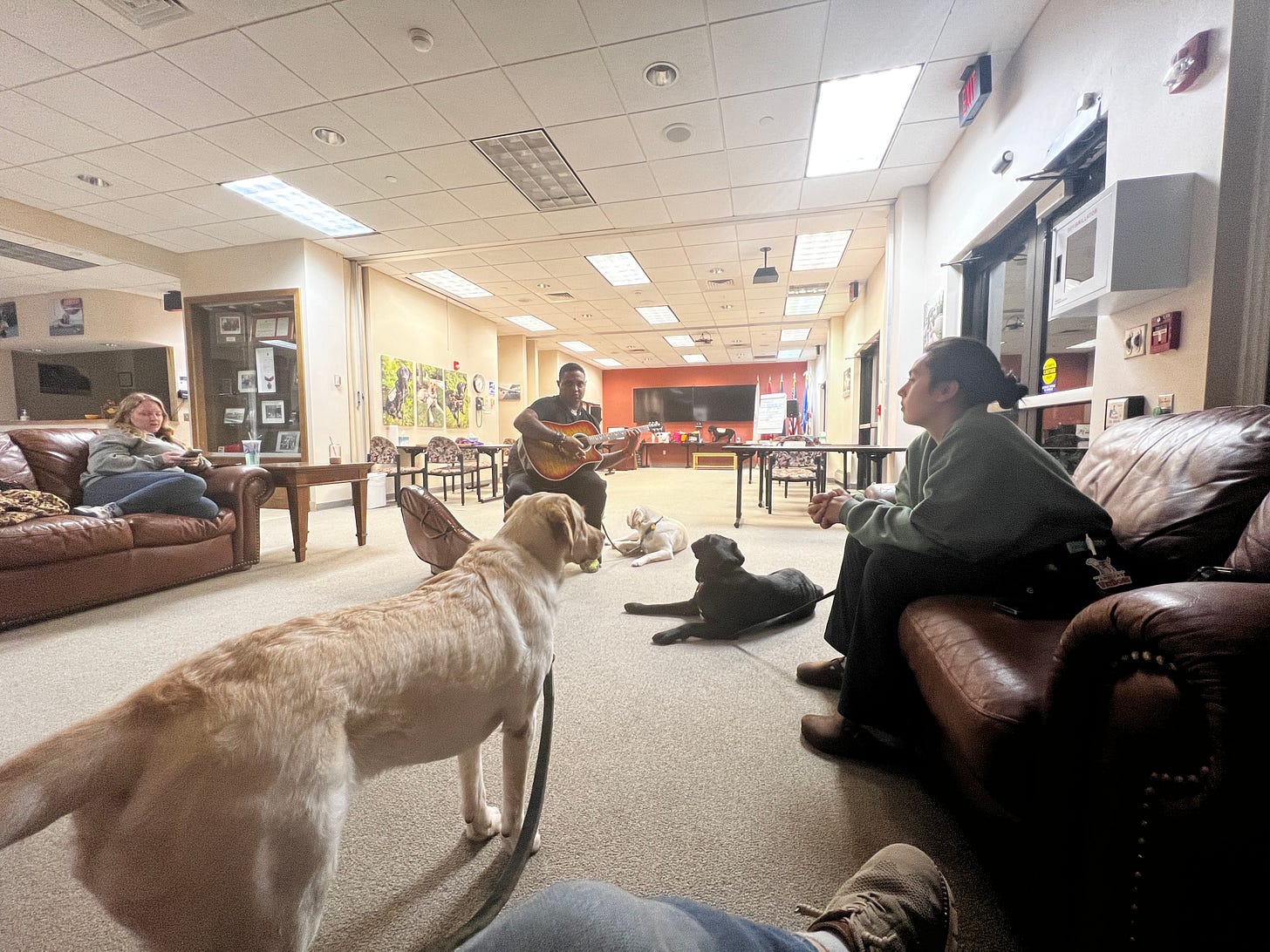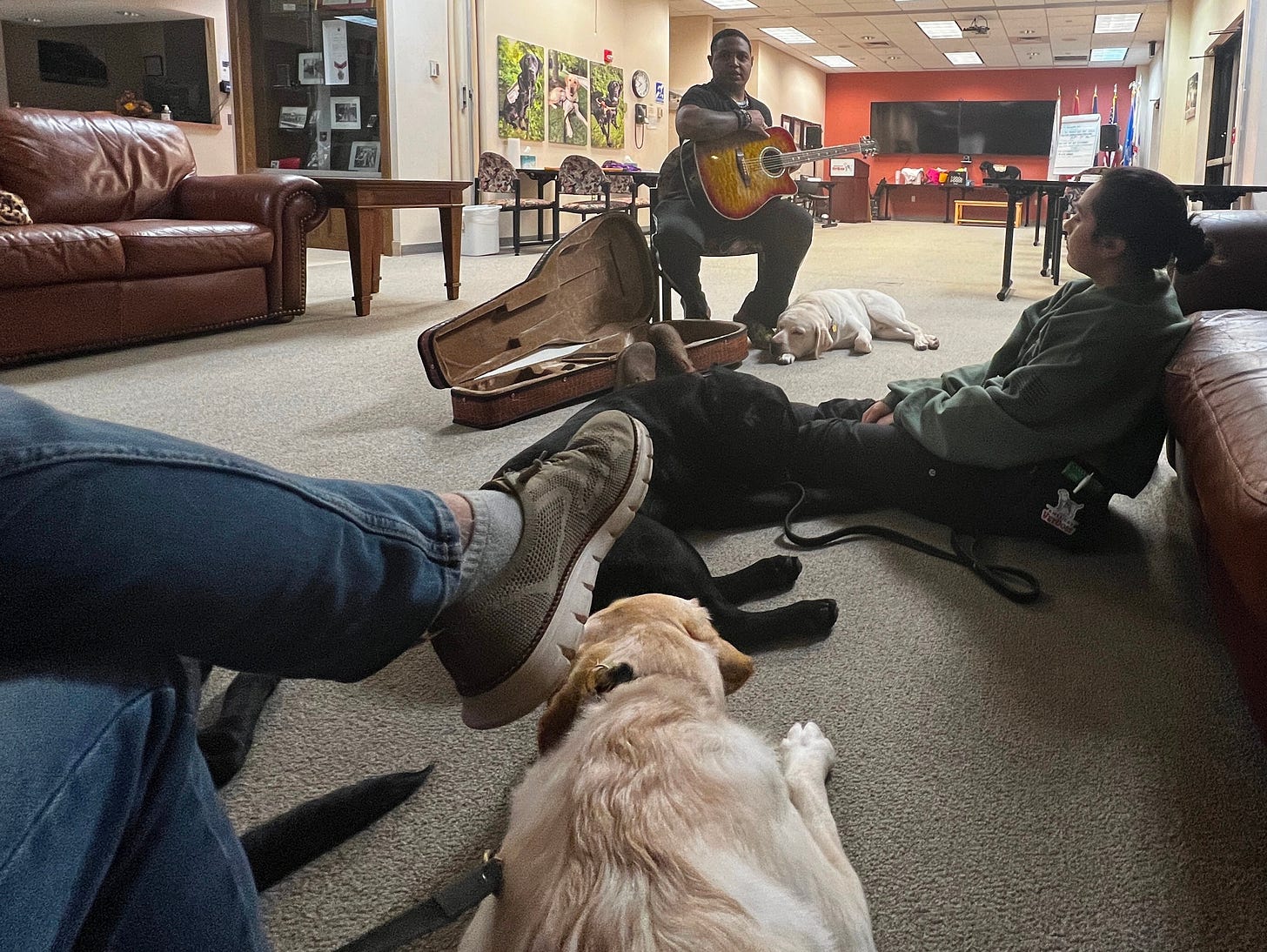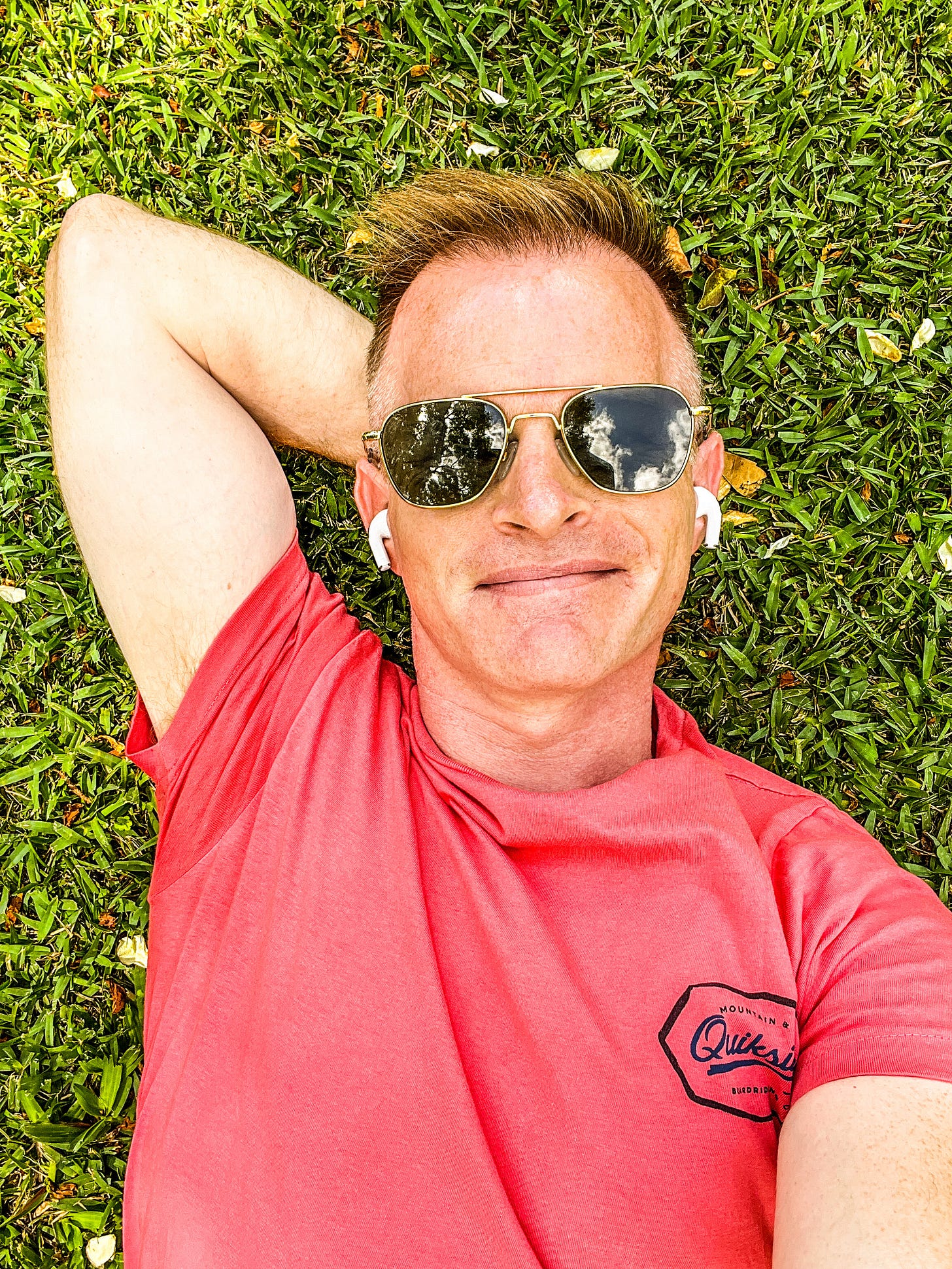About This Series
After years of silent struggle, I finally admitted I needed help. I began treatment for severe PTSD—long after my last deployment to Iraq—and was eventually recommended for a service dog through a Department of Defense program. I didn’t expect much when I said yes. I didn’t expect to wait two years. I didn’t expect to be cracked open.
This series is a raw, real-time account of what happened when I finally got the call. It follows the process of being matched with my service dog, Spirit, and the intensive training that followed. But it’s about more than learning commands or passing certifications. It’s about learning to stay. To soften. To be seen. To let love in.
These essays were written during the most transformative weeks of my life. I share them not as polished stories, but as honest reflections—for anyone who’s ever felt broken, alone, or unworthy of care. This is what healing looks like.
If this story resonates with you or you know someone who might be interested in reading it, please share! Writing is how I am healing. I am trying to grow an audience and find community.
The first morning after receiving Spirit, I tried to keep my morning routine: thirty minutes of calisthenics followed by twenty minutes of silent meditation.
It didn’t go as planned.
The moment I lowered myself to the floor, she assumed it was playtime. I was tackled mid-plank, licked mid-stretch, and tail-whipped across the face as I did dips on the edge of the bed. As I tried to balance in warrior pose, she leapt enthusiastically onto my back. When I finally sat cross-legged in silence, she stared at me like I had lost my mind. After a few minutes, she padded over and licked my face.
But routines—like relationships—are teachable. I worked with her throughout the last week, gently but firmly, teaching her that floor time didn’t mean wrestle time. When I sit in in silence doesn’t mean something is wrong. This morning when I rose and began my morning routine, she stayed in her bed as I moved through my exercises. She watched quietly as I showered. Waited calmly while I dressed. And then, when I finally opened the door, she turned toward me, eyes expectant.
Ready to work? I asked.
Her eyes answered: Yes. Let’s do that!
As has been the pattern, today’s challenges escalated from the previous. When the class began its morning walk, not only were toys scattered across our training path, but now a dog—off leash—darted among them, playing, chasing, baiting our dogs into chaos. Instructors lobbed squeaky balls and plush distractions with exaggerated flair, egging the loose dog on, encouraging it to spin and pounce in joyful rebellion. The goal was clear: to tempt our partners into disobedience. Our task was equally clear: to walk through it all, calm and steady, untouched by the noise.
The simulated city path curved through a patch of pine-shaded gravel and opened into a wider clearing meant to mimic an urban park—wood chips beneath our feet, chain-link fencing on one side, and a mock sidewalk with street signs and benches lining the perimeter. A row of training buildings stood behind us, their cinderblock walls softened by blooming flower beds and hand-painted murals. Early sun filtered through the trees, casting long shadows and a golden shimmer across the dew-soaked grass. Somewhere beyond the perimeter, a lawnmower hummed in the distance, the scent of cut grass drifting through the breeze.
Most dogs handled the mayhem with grace, glancing curiously but staying in stride. A few were momentarily swept up—pulling toward a tossed rope, or trying to engage with the bounding provocateur—but even they recovered quickly. The difference between today and last week wasn’t perfection; it was confidence.
No one panicked when a correction was needed. No one looked around, sheepish or ashamed. Our voices rang out—firm, calm, attuned. Not parroting words we were told to say, but speaking from something internalized. We weren’t hoping it would work. We knew it would. Because it had. Because we’d practiced. Because we trusted ourselves now.
There is something remarkable about watching people find their voice. We each had our own style by now—some spoke softly but with authority; others with clipped precision. Some walked with a steady rhythm, others with the athletic gait of someone ready to pivot. It didn’t matter how we did it. It mattered that we believed in the doing.
There’s no substitute for that kind of belief—not just in the dog, but in the team. In ourselves.
And so we crossed—dog, handler, voice, presence—one step at a time, through chaos, towards our own individual truth.
The Tough Get Tougher
Later that day, we headed out for what would become our most difficult field challenge yet: a two-mile trail walk that skirted the perimeter of a popular dog park. From the moment we stepped onto the trail, the chaos was relentless. Other dogs barked at our teams frantically behind chain-link fences, some lunging with such force they dragged their handlers off balance. Others were completely off-leash—bounding, spinning, nipping, and yapping with ecstatic abandon. The air was thick with the sounds of yelps, growls, and squeaky toys; it was a sensory overload for any dog, let alone one trying to do a job and stay on task.
More than once, passing dogs strained hard against their leashes to get to ours. One large dog launched toward a student with enough force to nearly knock him down. Their owner offered a sheepish grin and a half-hearted apology, saying, “Wow, your dogs are so well-behaved!” It was a compliment, but it felt like being saluted for holding formation while under fire.
Inside the open field, dogs chased frisbees and wrestled in the grass, free and gleeful. Meanwhile, we walked the perimeter like tense patrol units—alert, tight on the leash, correcting and redirecting at nearly every step. Even as focused and poised as our dogs are, each began to eventually vibrate with overstimulation, like sugar-rushed kindergarteners on the verge of a meltdown. Every squirrel, every bark, every plastic bag in the breeze became a test of patience and control.
By the end, all of the handlers looked wrecked. Sweat-soaked, mentally drained, rattled from the strain of constant vigilance. We may as well have returned from an all-night combat patrol. But there were no injuries. No incidents. No failures. Every team came through it stronger, more bonded, and far more aware of the work still ahead.
The experience also drove home something we’d been told again and again since Day One: do not take your service dog to dog parks or any high-distraction pet-centric public areas. And now we understood why.
Our dogs are not pets. They are professionals—trained to perform specific, high-level tasks in real-world environments. Tasks like matching their handler’s pace while descending stairs, holding a down-stay in the middle of a busy airport out of sight of their person, ignoring dropped food in a bustling deli, and staying calm while someone screams or collapses nearby.
Even the most obedient pet can’t match that level of consistency. Exposing our dogs to high-distraction areas like dog parks doesn’t strengthen their skills—it dulls them. It trains them to tune in to the wrong things. It puts unnecessary strain on the partnership we’ve worked so hard to build. Maintaining their focus, their poise, their calm—it’s our job now. And we take it seriously.
So when our instructor finally announced that our next stop was Dunkin’ Donuts, there was a collective sigh of relief and a ripple of laughter. After two miles of controlled chaos, we’d all earned a cup of coffee—and maybe a moment to sit quietly in the air conditioning, dogs curled at our feet, finally at peace.
The rest of the day unfolded in layers of learning, each one stacked upon the last until our minds felt as fatigued as our bodies. Between lectures and practical drills, we were pulled in and out of training buildings like tide against a jetty—repeating, refining, reinforcing.
We practiced navigating elevators with our dogs, teaching them to step on quickly, turn, and tuck into a corner without hesitation. We learned the choreography of entering revolving doors, push doors, automatic doors, and even the narrow, clattering turnstiles that choke the entrances to subway platforms—each one a different challenge in timing, pace, and communication.
We worked through mock scenarios designed to simulate real-life friction: What do you say when a waiter asks you to leave because of your dog? How do you handle a church usher who insists animals aren’t allowed? What if a curious child runs up to pet your dog in a crowded grocery store? These weren’t just hypotheticals. They were practice runs for moments that would come—moments where calm clarity would matter more than pride or anger.
Each simulation asked us to advocate without escalating. To hold firm while staying gracious. To educate without taking on the burden of someone else’s ignorance. It was harder than it sounds.
By the time evening came, we were dragging—shoulders hunched, brains foggy, dogs snoring under tables between drills. But the fatigue was different than before. It wasn’t the desperate exhaustion of survival-mode learning. It was the earned weariness that follows real growth.
Confidence wasn’t a spark anymore. It was an ember, steady and warm. We weren’t just learning new skills—it seemed like we were becoming something new.
Collapsing Into Breakthrough
After the day’s events officially concluded, I didn’t want to return to my room. I knew I would be tempted to lie down, and I’d probably never get up again. So instead, I collapsed onto the worn, overstuffed leather couches in the common area and tried to read emails. My laptop was perched on my crossed legs. Spirit sat at my feet like a sphinx. The room smelled of coffee, dog kibble, and old carpet—a strange mix that had already become familiar. Another student entered and sat nearby, her dog curling around her legs. We began to chat.
How did your puppy raiser call go? I asked.
It was good, she answered with a tired smile. They were really funny.
I began sharing about my phone call the night before. I told her of the two sisters and what I learned about Spirit’s time in prison.
Pretty quickly, whether due to the rawness of my emotions or the exhaustion of the day, my throat tightened, and I found myself crying again—for the second time in two days in front of a stranger. I tried to share my feelings through choked-up words, about how grateful I was for all the people who have worked so hard on my behalf. But even as I expressed that emotion, I could feel a deeper one crying out to be heard. And so I let it out.
I admitted the heavy truth: that I often feel like a phony, like I don’t deserve to be here. That the harshest, cruelest judgment I’ve ever felt comes not from others, but from myself. I cried and cried, letting tears roll down my cheeks and drip onto my t-shirt. I could never imagine crying so openly in front of a stranger before, but this training had broken me down to such an extent that I simply did not have the emotional resistance to keep it in anymore.
I was spent.
I had nothing left.
She listened quietly, nodded with knowing eyes, then asked softly,
How long do you think you have to hurt until you let the love in?
I froze. Every bone in my body wanted to flee.
I imagined myself storming back to my room, packing my bags, handing my leash back to the trainers and calling a cab to take me to the airport. I had such an overwhelming panic to escape at that moment. I felt vulnerable in a way that was deeply uncomfortable—frightening. I was embarrassed. I was hurting. I was messy and unraveling—everything I always tried to avoid at all costs.
And yet, I felt for the thousandth time in the past week a sense of overwhelming gratitude. I knew this person was really listening to me. I felt seen. Her words cut straight to the nerve and revealed the precise nature of my struggle. Never before had I felt so unworthy of so much love… yet I knew with increasing certainty that this was precisely what I was supposed to learn during this time—this was why I was here.
I wasn’t there as a veteran receiving a service dog. I was there to learn how to stop running.
To stop bracing.
To stop believing that being loved meant being inspected, evaluated, or earned.
I was there to sit still in the presence of kindness and let it wash over me without protest. To let someone see me in my unraveling and not flinch. To realize that what I always thought disqualified me—my mess, my tears, my fear—wasn’t a liability.
It was an invitation.
I wasn’t there to learn how to work with a dog. I was there to learn how to be a human being again. A soft one. A whole one. One that doesn’t have to hide or perform in order to be worthy.
The past several months had brought me several moments like this—times where I felt truly loved, and I began to see how quickly I fled from it out of fear. Tonight I knew I was on the verge of something new. I was learning that letting the love in begins with allowing someone to stay when you’re falling apart—and learning not to send them away.
Voices Of Healing
Later, as our conversation returned to more mundane and safe topics, another student entered with a beat-up acoustic guitar—something he’d found in a broom closet, he said. He used the broken edge of a plastic knife as a pick. He sat cross-legged on the floor, strumming chords, while the rest of us remained sprawled on couches or the carpet. Dogs lay in tangled piles on the floor, their breathing slow and rhythmic, paws twitching in dreams.
Other students trickled in. The guitar was passed around. New melodies floated through the air—soft, imperfect, welcome. Conversation flowed in and out like a tide. No structure, no expectations. Just the kind of rare openness that happens when broken people stop pretending they aren’t.
I told the group that I had considered leaving on day one. That I’d felt overwhelmed and unworthy. That I thought perhaps the dog should go to someone who needed her more. To my surprise, heads nodded. Others began sharing their own battles—depression, anxiety, anorexia. Frustration with the Veterans Administration. Shame. Fear. Fatigue. Nobody tried to fix anyone. We just let each other speak.
These were not the conversations of strangers. These were the rare, sacred bonds formed only among those who have stood watch in darkness, who have buried parts of themselves to survive, who have sworn oaths and lived through the weight of them.
I’m really glad you all are veterans, one person said during a lull. It’s not like this back home. I can’t talk like this with other people.
There was no response. Just nods. Eyes to the floor. We all knew that feeling.
But then something shifted. As the music played and the dogs snored, laughter began to rise. We watched each other do impressions of our dogs—exaggerated and hilarious. Someone retold the story of a dog who had stolen a meatball from a staff member’s plate during training. I laughed out loud, uncontrollably. I laughed and laughed, until suddenly I was crying again. And then I just kept laughing and crying until I couldn’t tell one from the other.
And I couldn’t stop.
And I didn’t want to.
The guitar began to play American Pie. Immediately, the group joined in—first beneath our breath, then with increasing volume and conviction. When the verse began, I sang out as a soloist—I’ve known every line of that song since I was a kid, and I’ve sung it in karaoke bars around the world. The group joined me on the chorus, and soon other students emerged from their dorm rooms, drawn by the sound of singing. Before long, everyone was gathered in the common room, singing loudly, exchanging smiles and knowing nods.
Tears continued to drip from my eyes as I raised my voice, higher and higher. I wasn’t showing off. I wasn’t performing. I was proclaiming.
This is who I am.
This is me.
Raw, unfiltered, messy.
Tension drained from my body in a flood of breath and tears, and for the first time since arriving, I felt… safe. Not just physically. Emotionally. Spiritually. I belonged—not because I’d earned it, but because I was here.
I looked down at Spirit, curled up beneath my feet, her ears flicking at the sound of the guitar. I reached down and touched her side. She shifted closer, eyes still closed.
So this is what it looks like to be embraced, I thought to myself.
To stay in the moment, allow it to sweep me up and carry me where it wants.
This is what it feels like to let love in.
About The Author
I’m a combat veteran, former special operations corpsman, and Navy-trained aviator who spent years chasing achievement to outrun pain. I hold a PhD in human-machine teaming and once led cutting-edge research for the Department of Defense. None of that helped me learn how to ask for help.
Now, I’m a full-time stay-at-home dad, homeschool teacher, and writer. I live a quieter life—one rooted in recovery, honesty, and learning to be human again. I write about healing, identity, complexity, and the long road home.
This is not the story I set out to write. But it’s the one that saved me.





